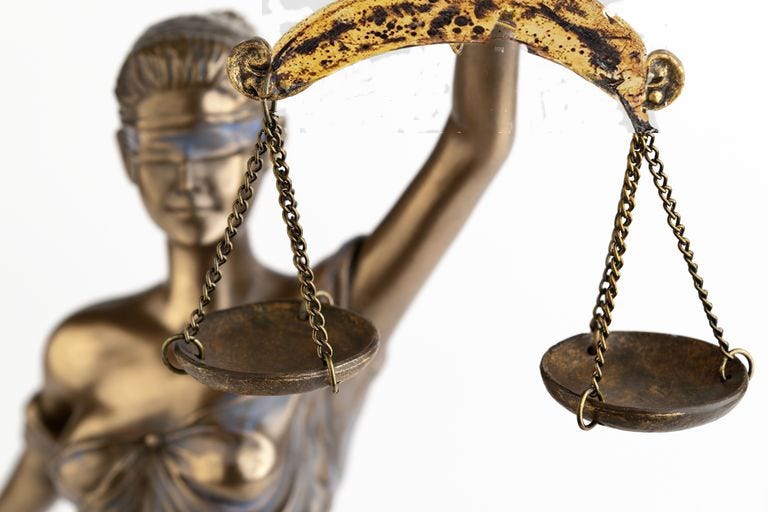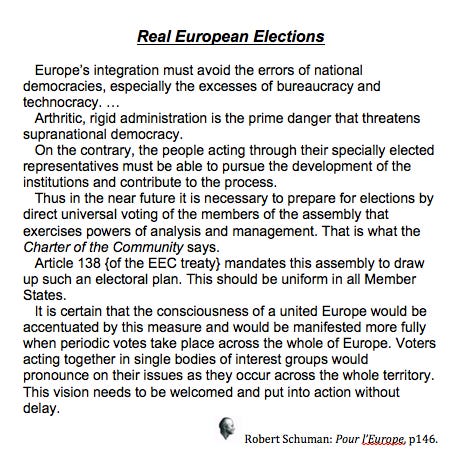
Europeans have NEVER had a fair and legal election to the European Parliament. Who is bending justice in USA and Europe?
A republic where the government wants to put the opposition candidate locked up in prison for 700 years on four quite disparate, trumped-up charges, initiated by the ‘Justice Department’ might be called a Banana republic.
If the powers of State gag the opposition from speaking, what can the people do? Protest. Convicted of 34 offences according to the government, Donald Trump gained $34 million in campaign contributions for him to fight in just 24 hours.
Some people clearly considered the scales of justice in heavily Democrat New York were being weighed against him. They were as bent as a banana. The case against Trump depends on levering an out-of-date, book-keeping entry dating back 7 years (itself dubious) and turning it into a federal case.
The NY judge should know that a State court is not competent to judge federal cases. Didn’t matter. In spite of this they found him guilty on all charges including federal ones! How come? Was it legal or political? Can Europe feel smug about legal dirty tricks?
First time in 250 years of history that a former president was taken to Court.
A Case held just before presidential elections is without precedence.
Old case revived after years and after it had passed statute of limitations.
Jury chosen in New York districts where Democrats had a massive majority in 2020.
Main prosecution witnesses were convicted or self-contradicting known liars. Witnesses for the defence such as a federal election lawyer were refused by the partisan judge.
Judge donated to Democrats; his daughter is making millions from the outcome.
The alleged crime was not defined to the defendant or the public. How can anyone defend against an unknown charge?
34 items are separate bank invoices and transfers to his lawyer. Are they Campaign contributions??
Jury was told to reject the NY statute that requires unanimity for all separate ‘offences’ of book-keeping.
Trump was given gag orders that are usually reserved for prosecution and told to attend Court for six weeks.
Lawfare blocked Trump’s campaign, wasted his money on lawyers and gagged him.
Watch out America! Lawfare works two ways. Extra-legal injustice systems are now likely to be used against Democrats. The Republican opposition can accuse the Biden administration of much, much worse real crimes, like treason, drugs and mafia-style racketeering. A violent reaction, however, would help lawfare provocateurs.
Europe’s Elites are its Bad Bananas
What about Europe? How bent are its elections and its law? Are all people free to vote or refuse to perpetuate a system they suspect is irrelevant?
What happened? Europe’s founding fathers who created the European Communities laid out fair and just elections.
The system must include:
The right of any mature citizen to vote.
The right of any citizen to create a party, peaceful movement or interest group.
No restrictions based on of educational level, religion, financial standing
One person, one vote.
No discrimination by age, gender or race
No artificial barriers, such as financial requirements, property-ownership.
No restriction by requiring signed agreement of existing government parties.
Generations of Democratic Deficit
For seventy-three years — nearly three-quarters of a century — the requirements that all European politicians should ensure legislation with one citizen, one vote has been in the treaties. Why then have politicians passed scads of laws — hundreds of thousands of pages of laws and regulations — and not dealt with the most important issue for Europe? Free and fair elections.
Let’s take them at look at some of these requirements that National parliaments insist on.
The European Union being a grouping of 27 democracies should in theory be more democratic than any of them and boast principles to be emulated.
Does it? Is it democratic? Is it European?
Are EU Elections European?
What does the European Parliament say? Does it boast that after decades of elections it fulfils all these? Is it the shining beacon for all democracies in Member States and the model of fairness for all States around the world?
This is what the European Parliament Fact Sheet on elections says to the question:
How old is a politically mature citizen?
No one knows! The EU has not decided on the age of a mature citizen. Young citizens tend to vote differently than older ones. Hence some parties favor them. To be fair across Europe, it is essential that only the same legally aged citizens are allowed to vote.
This is how the age of voters is skewed.
Austrians, Belgians, Germans and Maltese are super mature. They vote at 16 years.
Greeks vote at 17 years.
All the rest, from 22 States, believe that their citizens are mature at 18 years.
Who decides? National governments. They act contrary to European treaties that say there should be one statute for all. Who is taking these governments to court?
That seems a clear case of manipulation by governments of European electoral law. It is obvious discrimination.
What does the European Commission say?
The Commission boasts that it is the Guardian of the treaties. It is the judge of fair regulations.
How does the European Commission react to this criticism? The following question was put to the Commission’s Vice-President for European values, Margaritas Schinas in January, well ahead of the elections.
The treaties for the last 70 years, from the treaty of Paris, the treaties of Rome and the treaties of Lisbon, say that the election should take place under a single statute. This has not taken place. The manipulation by national governments of the voting system is not really in the treaties. As time is getting short do you see this treaty article, this long-standing treaty article of a single statute across Europe, being put into place?
It is a question I have asked regularly, election season after election season. No action was ever taken. Sample this answer.
Vice-president Schinas’s reply:
This has not been translated into a decision but frankly I would never, never describe the situation as being the manipulation of electoral law by Member States governments.
So is everything all right then? Can we all sleep peacefully knowing that the election system is in the hands of people with our best interests at heart?
North Korea’s Rival
The EU quite often changes the law and regulations about elections. New States join; some like the United Kingdom leave. But no small amendment has been made about giving citizens one vote each on an equal basis.
It has never even been suggested by the Commission.
As the Commission has the right to make this proposal the fault must lie squarely with them. The Commission shows lack of impartiality over many years. Conclusion: They do not seem to care less about citizens.
Why? It would perhaps interrupt the North Korean style system that has evolved to turn the EU into a Banana Union.
It is too hard for politicians and States to accept one citizen, one vote. If the elections were repaired, citizens and proper representatives might demand other measures, like open government. They might require the governments and bureaucrats to adhere to the treaty articles that are supposedly in force.
Open government as specified by the treaties would interrupt the way the secretive European Council decides who will be the Speaker/ President of the Parliament. And that would disturb the business program of the politicians.
The Border Problem
The elections have never taken place across the EU as a single district.
Votes are taken in Member States— this is how they are manipulated to serve the purposes of the governments. And remember, it is the government leaders in the secretive European Council that decide — with no press or citizens present — who will be the presidents of the various institutions, Commission, Council, Parliament and Central Bank. Governments with party politicians, not citizens, are in the driving seat.
But even the States are not equally divided. Some regions are more powerful than others. Some States divide their country into zones for votes; others take the country as one electoral district. This is also against the principles of a single statute.
Belgium, Ireland, Italy and Poland divide their voters into several constituencies. The others don’t. What is the logic behind this except manipulation?
Voting systems
Counting votes is not simple arithmetic for some States. Some employ complex maths to determine the winners that satisfy governments.
States have:
List systems where the first past the post wins;
Single transferable vote systems,
Preferential party political list voting systems.
So it is a bit of a lottery as to what your vote is worth because the governments have manipulated the system once again. No wonder your vote does not fit in the box.
What if you think it is all corrupt, fixed and a fraud? Well, the governments have got you there! You say you don’t want to vote? You want to say None of the Above on the ballot listing?
You think you are a free person?
Not on your life! A number of governments have thought that some citizens might be recalcitrant. They will fine anyone who doesn’t vote. The ‘democratic’ countries include Belgium, Bulgaria, Luxembourg, Cyprus and Greece. You don’t vote? More money with your fine for the politicians to spend!
Cutting out the critics
Should European citizens be voting for some strong personalities who may not have a powerful party behind them? Should they even be voting for parties? The European Parliament is supposedly there to defend the rights of individuals. The expression of political parties can be made through the councils, where governments send their ministers.
Originally the Parliament was not seated by groups of political parties. Seats were set in the hemicycle by alphabetical order of Members’ names. That way the MEP was free to vote as his conscience dictated. It also made more sense so that citizens with the same issues (often transnational issues not addressed by political ideologues) could find similar voices across the continent. For example people with disabilities, scientists in advanced professions, people with health problems caused by pharmaceuticals, those suffering from international cartels, and dissidents who disagreed with mainstream politics.
This idea was stopped. Political parties saw the elections as a means to restore their waning powers. Party membership has fallen over the years and the hollowed out organisations are held together by tax-payers money, that free citizens did not vote to provide.
Critics are usually a small but vocal minority. Governments don’t like them. So their politicians cut them out.They want to hinder such critical minorities joining forces across the EU. To avoid having a European network of critics of this type, the European Electoral Act 1976 (that did not create a single statute) specified a minimum of 5% for allocation of seats at a national level. Some States can also cut this to between 2 and 5% where the party list system is used.
Multiplying your Vote
If you were German and wanted to maximize your vote, where would you vote? Now that people can move freely across the EU and vote where they reside, where is the most effective place to vote? If the German citizen voted at home it would take about 390,000 voters to elect one MEP.
If the German resided in any one of the smaller States he would have the equivalent of anywhere between seven and ten votes in determining who the MEP was.
Estonia: 7 times the voting power (55,000 votes per MEP)
Cyprus: 8 times the voting power (48,000 votes)
Malta: nearly 9 times the voting power (45,000 Votes)
Luxembourg: 10 times the voting power. (40,000 votes).
Luxembourg not only has a small population but a large number of out-of-State residents. Some of the other States have a large number of expatriots seeking the sun.
This loop-hole or distortion is not only important in getting your view across to be debated because you are not competing with 389,549 other voters. It is also very important for lobbyists who know where and how to have a maximum effect on changing the laws and regulations in their favor.
It is also strategic in electing another even more important institution — the European Commission.
Curbing the Commission
The European Commission is like no other institution in the world. It was created to be an impartial arbiter of all matters European within the sectors of the Communities. It was to resolve disputes amongst nations, industries and citizens. The Commission also has a special and characteristic role in governance.
The Commission was the only institution that could propose legislation. It could sound out the needs of European society using the other institutions especially a fully elected Consultative Committees. These Committees have never been elected, as they should be according to the original treaty. So power-hungry politicians sought means to control the Commission themselves.
The Commission needs to be impartial. Thus no partisans should be part of it. That means no commissioner should retain membership of a political party. That is required by the oath of impartiality they take before the European Court.
Europe’s Lawfare by other Means
Are the present members of the Commission impartial? They are all members of parties — in total contradiction to their oaths of office. The first Commission had no party politicians. How did partisan politicians creep in?
The Commission should be impartial when it comes to political matters, so they can judge matters pragmatically.
The original system of choosing Commissioners required that the Member States proposed candidates and the public was then free to criticise if they thought any one of them was biased, corrupt or bent.
Is Europe about to have a Commission like the New York judge, a partisan of the US government party, who misuses the power of the law against an powerful and critical opponent?








No comments:
Post a Comment